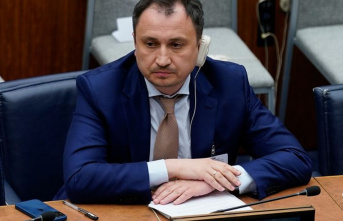The biggest surprise of Donald Trump's performance is that the former US President appears on stage on time. As always, he talks at length, an hour and 45 minutes at a weekend conference of the right-wing camp near Washington. And as with every speech, he reels off the same heroic stories about himself from his time in the White House.
Applause flares up especially when Trump agitates against trans people or migrants. Otherwise, the program highlight of the multi-day conference ripples along. The "Conservative Political Action Conference" (CPAC) has now become a kind of official meeting of the Trump fan club, where it is mostly loud, sometimes shrill. The 76-year-old wants to go back to the White House - but what competitors does he have with the Republicans?
The CPAC now takes place twice a year - in recent years the meeting has become a gathering place for right-wing nationalists, conspiracy theorists and the religious right. Here Trump is the star. The ticket costs just under 300 US dollars (around 280 euros), and a number of additional events are extra. Tradition is an online poll of respondents - and the most intriguing question is who they would most like to see as the Republican nominee for the 2024 presidential election.
Rivals are conspicuous by their absence
It's not surprising that Trump is winning here - he made his bid for the candidacy public back in November. 62 percent vote for him - a little less than at the CPAC last summer in the metropolis of Dallas. His potential rival Ron DeSantis, governor of the state of Florida, came second with 20 percent. He didn't even show up at the CPAC - just like Trump's former Vice President Mike Pence, who is also said to have ambitions for the highest office in the state. He wasn't well liked at CPAC.
Perry Johnson still has five percent. "Perry who?" one or the other may ask. The Republican businessman made his presidential plans public a few days ago. However, his application is considered not very promising - even if the 75-year-old now appeared at the CPAC and at least some should have noticed positively. An even narrower 3 percent of the vote goes to the much better-known former UN ambassador Nikki Haley, who was then promoted to her prestigious post by Trump and began her campaign in February. She doesn't really get the audience at CPAC excited about her.
Almost like blasphemy
When the 51-year-old Republican indirectly attacks top dog Trump in her speech, the silence in the hall is almost palpable. If the name of the former governor of the state of South Carolina is mentioned in the huge conference hotel, it is not uncommon for people to boo. The fact that Haley is up against her former boss Trump may be a kind of blasphemy for some. "In our world, she's something of an establishment," says Regina from the city of Zionsville, Indiana. She is a Trump supporter and wears blue sunglasses with star-shaped lenses - the outfit is inspired by the US flag in red and white. She and her friend left the hall on purpose when Haley came on stage, says Regina.
How representative CPAC is of the party as a whole is hard to say. The fact is that Trump is also ahead in other polls among Republicans. But not everyone at CPAC is quite sure about Trump's second term. "I mean, he's brave," says a visitor named Joyce from Pennsylvania, who studied in Germany in the 1970s. Looking ahead to the 2024 election, she says, "I just think we need to find the best candidate who has a chance of winning." And it doesn't have to be Trump. Then she uses the usual clichés - the violent storming of the Capitol was misrepresented, in addition to men and women there are now about "57 genders" and children are dangerously indoctrinated in schools.
Also a guest from Brazil
It's the sound of the CPAC. This is where the far-right emerge - with their spokespeople in the House of Representatives Marjorie Taylor Greene and Lauren Boebert. Brazil's right-wing ex-president Jair Bolsonaro also speaks, railing against so-called gender ideology and compulsory corona vaccination. No conspiracy theory seems too wild, no insult too crude. Minorities and those who think differently are being hounded here, a Christian theocracy is being demanded, and the Ukrainian President Volodymyr Zelenskyj is being cursed at. It is a parallel world in which there seems to be no borders. But all of this isn't a new tone; it's the language that broad swathes of Republicans have been speaking for years. And Trump is an integral part.
"We will dismantle the 'deep state', we will destroy tyranny, and we will restore the American republic in all its radiant glory. With God's help and your support, we will make America powerful again" - it's sentences like this, with which Trump ends his speech, which at times seems like a confused monologue. Behind the term "deep state" used in conspiracy myths is the idea that secret powers are pulling the strings in the background of political decisions. It is fitting that CPAC sells T-shirts showing US President Joe Biden with a Hitler beard. "Not my dictator" is written on it. If you ask around, hardly anyone believes that Biden is the legitimate President of the United States.
And it's fitting that one of the most acclaimed speakers is Kari Lake. The 53-year-old lost the governorship of Arizona in November. Like Trump, she does not want to accept her election defeat. Most recently, she failed in court with a lawsuit. That doesn't stop them from claiming in front of hundreds of spectators at CPAC that dark forces - that is, Biden's Democrats - robbed them of victory. The applause is huge. If sowing doubts about democratic elections were not so dangerous, their appearance would almost be regrettable. At CPAC, they want Lake to become vice president.











